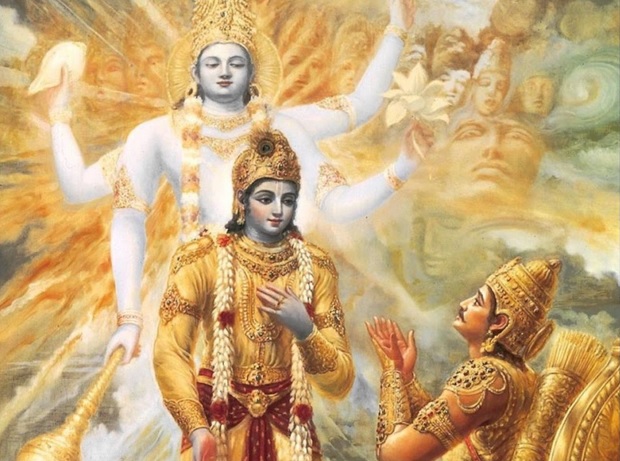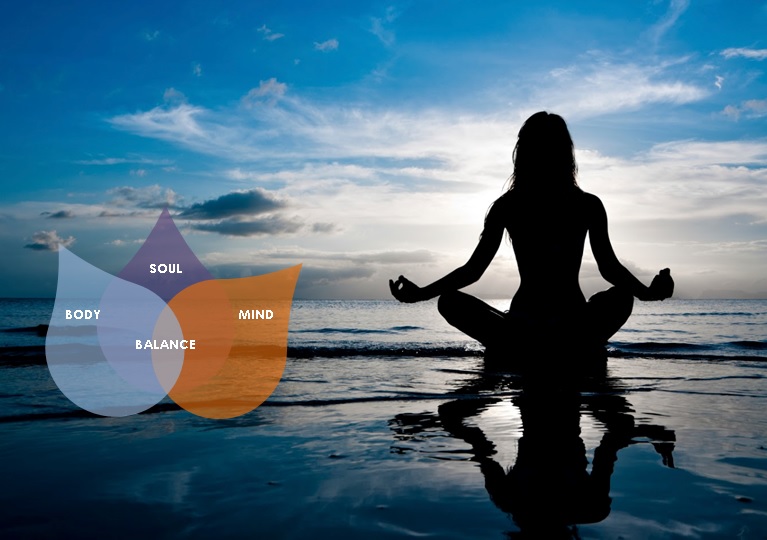I recently had an opportunity to experience ‘Death Meditation’ guided by a wonderful master from India. Death Meditation is a simple, but very powerful meditation technique to introduce ourselves to our own death through vivid imagination. The idea is to experience how fragile the physical body is and that the only thing remain intact and untouched after our death is our soul, the ātman.
As I visualized my body being cremated during this meditation, I realized that everything I considered mine all my life – my success, my failures, my sorrows, my friends, loved ones, enemies, my plans, my dreams, and just about everything, lost their relevance and my body merged into the chemistry of the nature. My mind withdrew itself and ceased to exist. My loved ones and friends who were standing by my funeral moved away as the heat increased from the fire that was burning my physical body into ashes. I felt deeply that the one and only thing that remained untouched, that even my death could not destroy, was the Soul. The Ātman. The Self.
[pullquote]
“There was never a time when I did not exist. There was never a time when you [Arjuna, all the kings in the battlefield and all other living beings] did not exist. Then where is the question of death?”
[/pullquote]
This experience makes a big difference in the way I see myself and everything else around me. I contemplated a lot about the body, the mind and the soul. I recalled reading this conversation between Lord Krishna and Arjuna in Bhagavad Gita. Bewildered by the fact that he has to kill his grandfather, teachers and kins, Arjuna tells Lord Krishna in the battlefield of Kurukshetra, “…it would be better to live by begging than to live at the cost of the lives of these great souls [that Arjuna was meant to fight] who are my teachers”. In reply to this, Lord Krishna explains to Arjuna the difference between the body and the soul in the following verse;
na tv evāhaṁ jātu nāsaṁ na tvaṁ neme janādhipāḥ
na caiva na bhaviṣyāmaḥ sarve vayam ataḥ param”
न त्वेवाहं जातु नासं न त्वं नेमे जनाधिपाः।
न चैव न भविष्यामः सर्वे वयमतः परम्॥ – Gita 2:12
“There was never a time when I did not exist. There was never a time when you [Arjuna, all the kings in the battlefield and all other living beings] did not exist. Then where is the question of death?”
Lord Krishna puts forth this to illustrate that the Lord himself, Arjuna and all the other living beings are eternal. Through this statement, Krishna is establishing that the soul and the body are separate. They can never be equated. The soul is eternal while our physical body is transient. Krishna is asserting that, it is not as if his grandfather, Bishma Pitamaha, or all the kings on the battlefield did not exist before the time of this battle. They have been in existence for time immemorial transmigrating from body to body and they will never cease to exist regardless of being killed in the battlefield.
As Lord Krishna says in Gita, if our soul is eternal and it transmigrates from body to body and our current body is only a temporary container for our soul, then what is the true nature of “I” that we are so obsessed identifying with our body and the mind? Is “I” our body or the mind or both? If it is our body, it must have a birth and death. How can that be eternal? Are any parts of your body You? Is the blood in your body You? Is the water in your body You? Or are the cells in your body You?
One of the greatest gurus from India, Ramana Maharshi, says, ‘You are not the gross body which is composed of the seven dhātus which are plasma (rasa), blood (rakta), muscle (mamsa), fat (medas), bone (asthi), marrow / nerve (majja) and reproductive (shukra) tissue. Neither you are the five cognitive sense organs which are ear, skin, eye, tongue and nose. Or the five vital airs which are prāna, apāna, udāna, vyāna and samāna. You are not your mind which is the root of all your thoughts. Neither you are your ignorance which believes that this illusory world is real.’
Then who am I? He continues, ‘The “I” is the absolute awareness that you are none of the above’ (that you are neither your body, nor your mind).
It is very difficult to come to this realization that we are not our body and not our mind. However, through spiritual practices and meditations, if we start recognizing our physical body simply as a vehicle, a container, for our eternal soul, we could stop misidentifying ourselves with something we are not and avoid going through all the pain and sufferings which basically arise from the misidentification of “I”. We have been living all our life with this mistaken identity that ‘I am my mind and my body’ even though both of these are transient and transitional as opposed to our spiritual identity which is eternal, pure consciousness and ultimate joy – paramananda.
Krishna says,
antavanta ime dehā nityasyoktāḥ śarīriṇaḥ
anāśino ’prameyasya tasmād yudhyasva bhārata
अन्तवन्त इमे देहा नित्यस्योक्ताः शरीरिणः।
अनाशिनो प्रमेयस्य तस्मादु युध्यस्य भारत॥ – Gita 2:18
‘Our physical body is sure to come to an end. Its just a matter of time, it could perish at this very moment or after 100 years. There is no way one can maintain the physical body forever.’
According to researches, every cells in our body is replaced and / or regenerated every 7 years. Our body has already gone through so much change without even we realizing it. Every cells in our body may have already been regenerated over the past years. Yet, having a body that is so fragile and perishable, we are so obsessed with our exterior covering that our whole life starts to revolve around it. We worry and spend so much of our time and money to stay young, to avoid disease and death, but with no avail. Since the physical body has a birth, it must have a death too.
[pullquote]
The “I” is the absolute awareness that you are none of the above
[/pullquote]
And our mind is a raging elephant residing in our Self causing all the thoughts to arise. When there are no thoughts, there is no mind. The very nature of the mind is thoughts. The mind can never stand on its own. It is always dependent on the physical body. We must realize that our thoughts are not ours. They are intruders. Thoughts come and go like birds flying from one tree to another. Thoughts stay with us only when we start identifying ourselves with the thoughts and start to believe that they are ours.
How can we control our mind that even Arjuna who is also known as Parantapa (one who concentrates the most, destroyer of enemies through his concentration) finds it most difficult? Arjuna says, “Oh Krishna, controlling the wind is easier than controlling our mind”?

One of the ways to control our mind, according to Tantra, is to be a witness of our thoughts. We must realize that the thoughts are energy particles floating around in the vast ocean that surrounds us. They come uninvited. As long as we don’t get involved with them, they don’t belong to us, neither do they find a host in you. Be a witness of our own thoughts and let thoughts pass through you, like pouring water through a hollow bamboo, with no hindrances.
Like Eckhart Tolle says in the Power of Now, our mind is merely a tool we should be using for specific tasks or purposes. We must learn to detach ourselves from our mind once the task is completed and be empty of thoughts. As we already know, most of our thoughts are repetitive and useless. They often cause us more harm than good.
Gita says,
bandhur atmatmanas tasya yenatmaivatmana jitah
anatmanas tu satrutve vartetatmaiva satru-vat
(बन्धुरात्मात्मनस्तस्य येनात्मैवात्मना जितः।
अनात्मनस्तु शत्रुत्वे वर्ततात्मैव शत्रुवत्॥) – Gita 6:6
‘For someone who has conquered the mind, the mind becomes the best friend; but for one who has failed to do so, the very same mind will be his greatest enemy’.
Our mind can be both our friend and an enemy. It all depends on how we use our mind.
We have to become aware of our true self, that we are not the body or the mind, but ātman, brahman, or the soul, which neither has birth nor death. Of course, it is not easy to stop identifying our soul with the body and the mind, but through meditation and spiritual practices, we will surely realize our true self which is pure happiness.
Does this mean that we don’t need to take care of our body or the mind? Not at all. Body is a chariot that carries our soul / ātman. The mind is the reins. Our senses are the horse. Our intellect (buddhi) is the driver. Our soul is the lord of the chariot. Only if we have our reins (mind) firm and our senses under control using our intellect (buddhi), can the chariot reach the destination – moksha (liberation from the cycle of birth and death). What we need to do is to stop our obsession with our body and the mind and our misidentification with both of them.
will be continued…

